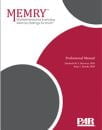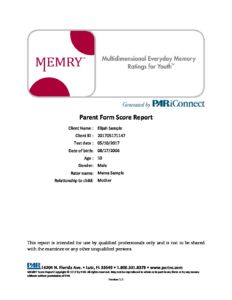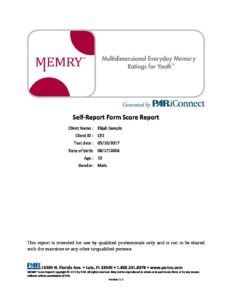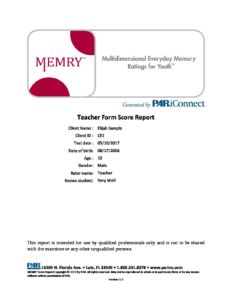
Multidimensional Everyday Memory Ratings for Youth memry
For: Measure everyday memory, learning, and executive aspects of memory in 5 to 21 year olds
Format: Paper-and-Pencil; Online (via PARiConnect)
Length: Individual or group administration - 5 minutes to administer, 5 minutes scoring time
Scoring: Hand Scored; Online
Online Forms, Reports, Kits & e-Manuals
All online resources including Forms, Reports, i-Admins, Kits and e-Manuals.
Printed Forms & Handscoring Materials
Test forms, response booklets and scoring reference manuals.
MEMRY online Score Report (each) min order 5
MEMRY online i-Admin (each) min order 5
MEMRY Parent Forms (25)
MEMRY Parent Scoring Summary Forms (pad of 25)
MEMRY Professional Manual with Fast Guide
MEMRY Self-Report Forms (25)
MEMRY Self-Report Scoring Summary Forms (pad of 25)
MEMRY Teacher Forms (25)
MEMRY Teacher Scoring Summary Forms (pad of 25)
Contact PAA today to set up your free PARiConnect online account to utilise online administration, scoring and reporting.
Authors
Elisabeth M. S. Sherman, Ph.D, and Brian L. Brooks, Ph.D
Description
The MEMRY is the first (USA) nationally standardised rating scale specifically designed to measure memory in children, adolescents, and young adults aged 5 to 21 years. It measures daily memory, learning, and executive aspects of memory including working memory.
The MEMRY provides rapid screening for memory problems in youth, an ecologically relevant assessment of memory in everyday life, and multiple perspectives about memory capacity from different raters. The MEMRY may be used to determine whether a more comprehensive evaluation is required or as a core component of a comprehensive assessment for youth suspected of memory problems.
Everyday memory is facilitated by semantic associations, environmental cues, and emotional saliency, and occurs alongside normal distractions. This is unlike the highly controlled testing environment presented in most objective memory tests, making the MEMRY more true to real-life situations.
Three different validity scales (Implausibility, Inconsistency, and Maximizing) make the MEMRY ideal for clinical use. MEMRY offers an inexpensive, quick and easy measure to integrate into busy clinical settings as a screening or as a core component of a comprehensive assessment.
Features and Benefits
Features Parent, Teacher and Self-Report forms.
Features Parent and Teacher report (for ages 5-19 years) and Self-report (for ages 9-21 years).
Allows for the evaluation and quantification of real-world functional memory problems that can not be elicited in testing alone.
Helps clinicians understand the impact of memory problems on daily functioning.
Provides intervention recommendations based on MEMRY scores.
Test structure
Includes an overall score, the Everyday Memory Index (EMI), as well as scales that tap learning, daily memory, and executive/working memory and three validity scales.
Paper-and-pencil administration may be completed quickly.
Technical Information
Scale scores include T scores, confidence intervals and percentiles.
Discrepancy scores allow for comparison between scale scores.
Normative sample included 845 youth, 450 teachers, and 1,080 parents and was closely approximated to the U.S. Census in terms of age, gender, and ethnicity.
Clinical group analyses were conducted with ADHD, ASD, reading disability, math disability, language disability, traumatic brain injury and intellectual disability groups.
Validity scales are designed to flag protocols that are likely to reflect inconsistent, exaggerated or implausible responses and include sophisticated validity indicators designed to detect exaggeration and feigning.
Co-normed with the Child and Adolescent Memory Profile (ChAMP) and the Memory Validity Profile (MVP).
Related Products
NB: Prices are in Australian dollars inclusive of GST. NZ customers need to log in to view ex-GST prices.
 NZ
NZ







